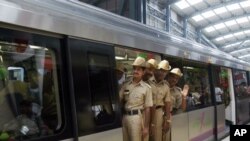A new passenger rail service has been launched in India’s information technology hub, Bangalore, a city famed as much for its technology skills as for its huge traffic snarls.
Still, hopes are high that the mass transit system will ease some of the city’s chronic transport woes.
Mohandas Pai, a former senior official with Indian information technology giant Infosys, said it was “exhilarating” to ride on Bangalore’s metro and hopes it will improve the quality of life in the city.
“We have traveled on metros around the world, but to have the metro in your own city after waiting for so long is wonderful," Pai said. "This metro will mark the transformation of Bangalore.”
This sentiment was echoed by senior Indian ministers and business leaders who also traveled on the first section of the rail transit system on Thursday.
The 6.7 kilometers of elevated track connects an eastern suburb with Bangalore's central business district. The entire 42-kilometer network is set to be completed by 2014.
Millions of residents in the city known as India’s Silicon Valley will soon benefit, said Indian Urban Development Minister Kamal Nath.
“It will give a lot of relief to the people of Bangalore,” Nath said.
Bangalore is the third Indian city to get a metro network after Kolkata and the Indian capital, New Delhi.
The city emerged as a software hub in the 1990s when Indian and information technology companies began tapping into the country’s huge pool of low wage software programmers. Several international companies have since followed suit, running their back office operations from Bangalore.
But like many other Indian cities, Bangalore’s infrastructure has failed to keep pace with its runaway growth.
Today the city is home to about eight million people and four million vehicles. They jostle for space on a crowded, potholed, inadequate road network. At peak hours, speeds can drop to 15 kilometers per hour. IBM recently ranked Bangalore as the world's sixth most painful city for commuters.
This traffic congestion has dealt a blow to Bangalore's reputation as a high-tech, business friendly center. IT giants have expressed worries about investment fleeing to other cities.
“Everybody talks about Bangalore, even President [Barack] Obama spoke about Bangalore," said Sumitra Iyengar, director of infrastructure at the Bangalore Chamber of Industry and Commerce. "And having said that, this traffic situation was creating a negative image about us and we are pleased to see that now there is a certain change happening.”
The real impact of the new metro system remains to be seen, as many suburbs where major companies are based have not yet been connected to Bangalore via the rail system.
With three more years until the network's completion, many of Bangalore's information technology companies will likely continue to spend millions of dollars to help transport their employees to and from work via buses and taxis.




